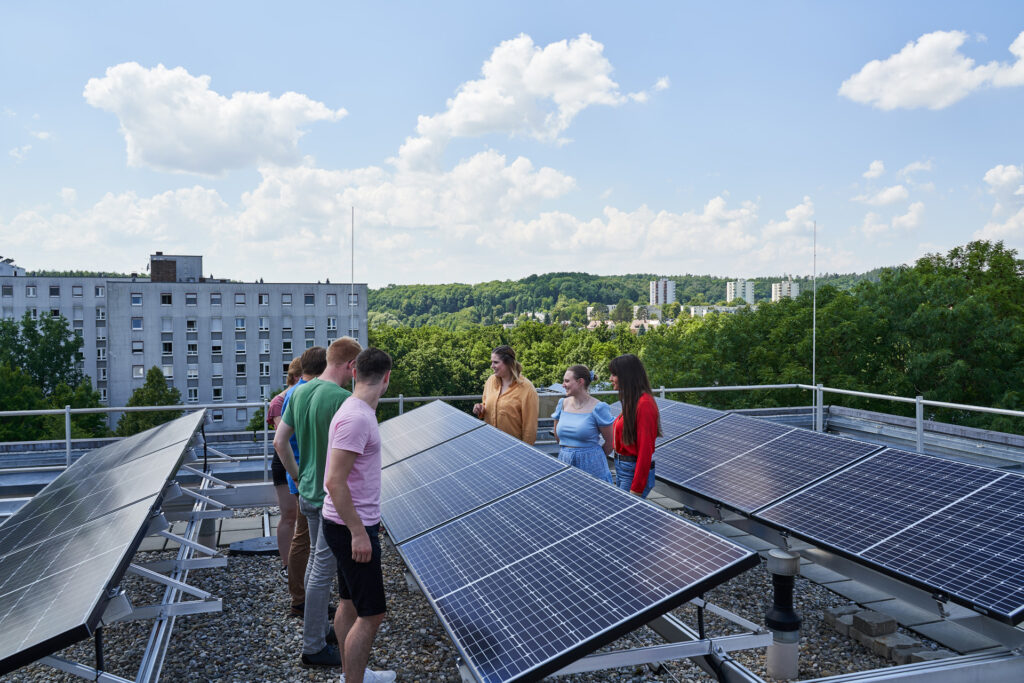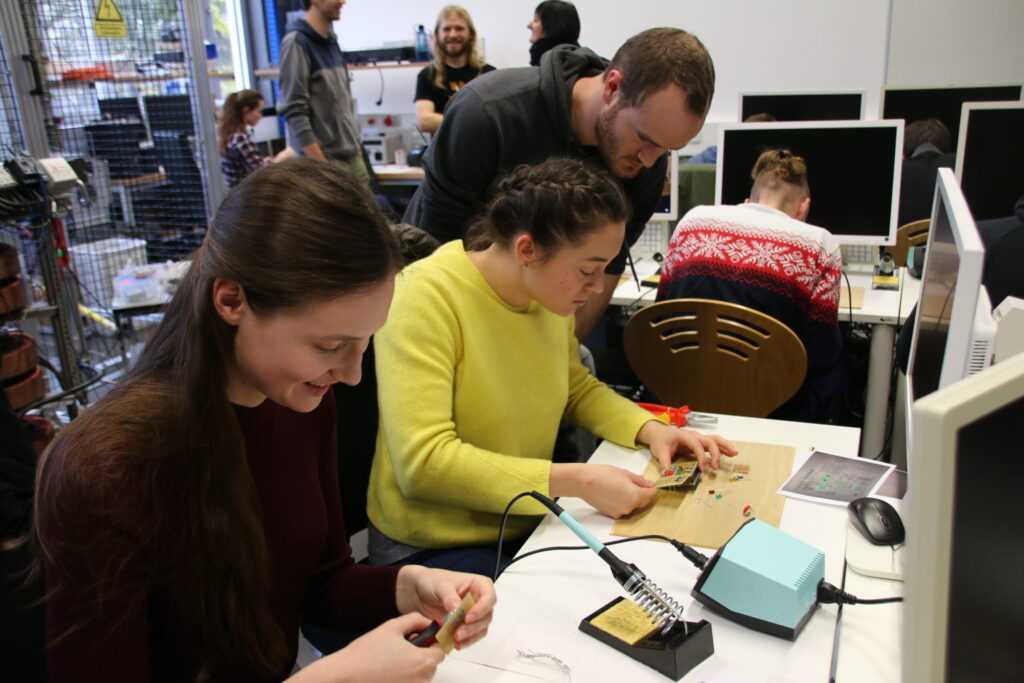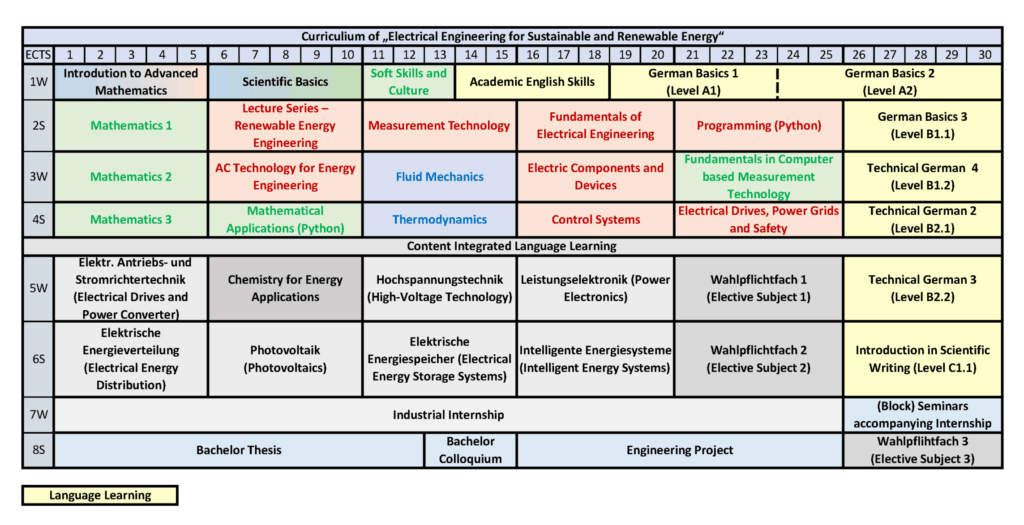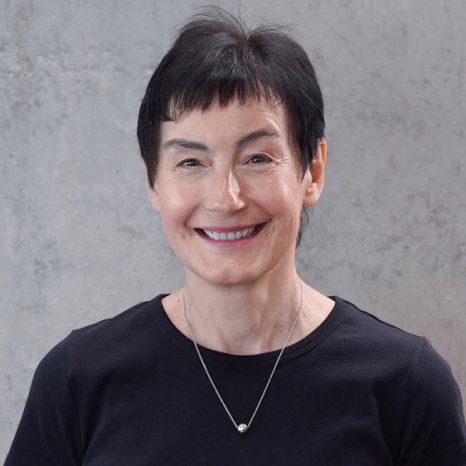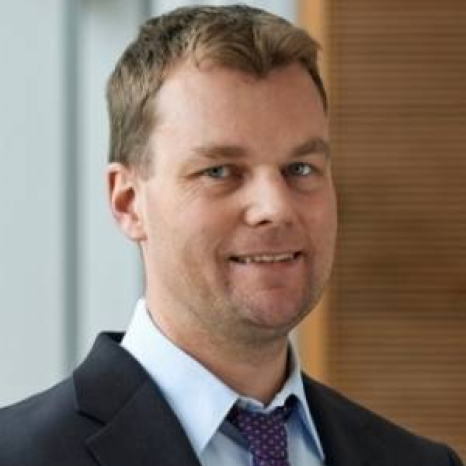Electrical Engineering for Sustainable and Renewable Energy
At a glance
Academic degree
Bachelor of Engineering (B.Eng.)
Form of study
Full-time
Standard period of study
8 semesters (incl. Industrial Internship and Bachelor Thesis), 240 ECTS
Place of study
Language of instruction
English and German
Start of studies
Winter term (October 01)
Please note! Teaching in the first semester is offered exclusively in virtual environment (digital and online teaching). From the second semester onwards, you will study in person at the university.
Admission requirements
- University entrance qualification, entrance qualification for universities of applied sciences, vocational qualification or foreign educational certificate
- International applicants require a certificate assessment (APS certificate, VPD from uniassist or evaluation of the ZAB). You can find more information here
- Curriculum vitae
- Official proof of English language proficiency at level B2
Fees
The fees for international students from non-EU countries amount to €1,500 per semester. Find out more here: Tuition fees for students from non-EU countries
In addition, there is the current semester fee. Find out more here.
Registration
Registration deadline for the winter term: 15 July 2026
Profile of the degree program
The Bachelor's program in Electrical Engineering for Sustainable and Renewable Energy at Coburg University prepares you to meet the growing global demand for sustainable energy solutions. Over eight semesters, including a practical internship, you will build solid expertise in electrical engineering, with a focus on renewable generation, storage, and distribution technologies.
In the first four semesters, taught mainly in English, you will strengthen your foundation in mathematics, physics, and key engineering principles such as AC technology and measurement techniques. At the same time, you will advance your German language skills from beginner (A1/A2) to upper-intermediate (B2), preparing you for advanced modules taught in German later in the program. Hands-on laboratory work and practical exercises complement the coursework, ensuring you gain both technical knowledge and problem-solving skills.
As you progress, you will dive deeper into cutting-edge topics like photovoltaics, smart grids, high-voltage engineering, and power electronics — always with a focus on sustainable and future-oriented energy infrastructures. An interdisciplinary approach also introduces economic and managerial perspectives, equipping you for complex professional environments.
A key element is the 20-week industrial internship, usually at a German company, where you apply your knowledge, expand your network, and gain valuable industry experience. Your studies conclude with an engineering project and a Bachelor Thesis, where you conduct research in areas such as grid management or energy storage.
Graduates earn a Bachelor of Engineering (B.Eng.) and are well prepared for careers in energy companies, research institutions, or public agencies. You also have the option to continue with master's studies to further specialize.
With its blend of advanced engineering training and strong language skills, the program empowers you to actively shape the future of sustainable energy.
What's special about the Electrical Engineering for Sustainable and Renewable Energy course in Coburg?
Engineering – Made in Germany: You study with us to qualify for many different industries and secure a wide range of career options worldwide!
You start your studies as a distance learning program (first semester)!
You start studying abroad, away from home – that's a big challenge, you have to organize a lot in advance! We give you the time to do this, time to prepare for life in Germany, time to arrive here with us. Familiarize yourself with Germany, especially with Bavaria and the city of Coburg – we support you with the "Soft Skills and Culture" module, among other things -, find suitable accommodation, get a visa if necessary – and do all this from the comfort of your own home! Teaching in the first semester therefore takes place entirely in virtual and digital teaching formats, i.e. you can study from any location and at any time and prepare for the face-to-face course from the second semester onwards.
No knowledge of the German language is necessary in the beginning!
Perhaps you are not yet familiar with the German language? That's no problem at all if you study with us! In the first semester you will start learning German without any previous knowledge. By the beginning of the second semester, when you will start attending classes here in Coburg, you will have mastered the German language sufficiently to be able to make yourself understood when shopping, for example. After that, you will continue to learn German in order to be prepared for the German job market. So even if you don't speak German yet, take courage and trust us, we will give you a warm welcome and say: "Hallo, wir freuen uns sehr, dass Du bei uns studierst"!
You study parts of the course together with students from other degree programs!
In some modules, teaching takes place together with students from the fields of natural sciences and electrical engineering. Here you can make valuable contacts, look beyond the boundaries of electrical engineering and benefit from the experience and skills of your fellow students. The insight into different approaches and procedures in problem solving will be very fruitful for your personal development. You will learn how to work effectively with specialists from other disciplines, which is often necessary in complex projects.
You finish your studies with a direct entry into the world of work!
After six semesters at university, you'll be ready for the industry! In a 20-week industrial internship, you will familiarize yourself with the processes in a company and the activities in the field of engineering. Finally, you will choose an interesting topic for your Bachelor's thesis and prepare for it. An experienced employee of the company and a professor from the university will accompany and supervise you during your Bachelor's thesis.
Course content and schedule
Overview of the modules
In the left column you can see the number of the semester (W means winter semester, S summer semester). ECTS is the abbreviation for European Credit Transfer System.
The colored modules shown in the first 4 semesters you will study together with students of other study courses or faculties respectively. Hereby the host faculties are
- Mechanical and automotive engineering (blue)
- Applied natural sciences and health (green)
- Electrical engineering and computer science (red).
In yellow you can see the language training modules, especially the modules for learning German to level C1.
Semester 1: Starting semester with virtual / online teaching
We do not expect any special prior knowledge at the start of the course, just a basic knowledge of mathematics and science at school level and a command of English (level B2). In this first semester, you will cross the bridge from school to the University of applied sciences and arts!
- Mathematics and Scientific Basics
- Soft Skills and Culture
- English and German
Semester 2-4
Fundamentals of Mathematics, Mechanics, Programming and Electrical Engineering
Semester 5 and 6
Deepening the knowledge in the fields of Power Engineering and Renewable Energy with various compulsory and elective subjects. As your German should be now on level B2, most subjects will be held in German now with available skripts in English. This integrated Language Learning and additional German modules raise your German to level C1 which will prepare you for your industrial Internship which will take part in semester 7.
Semester 7 and 8: Internship and final semester incl. Bachelor thesis
To be able to start the internship semester, you must have successfully passed all modules from semesters one, two and three. The practical semester comprises 20 weeks of full-time work experience and two practical courses. Registration for the Bachelor's thesis is only possible if a proper report on the industrial placement has been submitted.
- Industrial Internship
- Seminars accompanying the internship like Project Management
- Elective Subject
- Engineering Project (can be combined with the bachelor thesis)
- Bachelor Thesis and Seminar
Job & Career
The phase-out of nuclear energy and the ongoing transition towards renewable energy sources present a significant and exciting challenge for the electrical power industry: a complete transformation of our energy systems is underway. To successfully shape this energy future, we will need electrical engineers with deep expertise in the generation, storage, and distribution of renewable energies.
Graduates of this degree program will be highly sought-after specialists, opening up excellent career prospects and attractive earning potential in a rapidly growing and future-proof sector.
Beyond exciting job opportunities in industry and energy supply, this degree also paves the way for a career in research and development — where you can actively contribute to the innovations that will drive the energy systems of tomorrow.
If you are passionate about sustainable technology and want to play a key role in one of the most important transformations of our time, this is the degree for you.
Questions about the application
Contact
T. +49 9561 317-246
study affairs@hs-coburg.de
FAQs
Where is the city of Coburg located?
Coburg is a medium-sized town with around 42,000 inhabitants. It is located more or less in the middle of Germany or in the north of the federal state of Bavaria. Coburg offers an excellent infrastructure, such as a train connection to the major cities of Munich or Berlin, and thus to international airports, with Deutsche Bahn.
Do I have to take out health insurance if I study in Germany?
Yes, you absolutely need health insurance to study in Germany. You can find more information here: Before your arrival | Hochschule Coburg or Healthcare and Health Insurance – DAAD.
Where do I have to go if I need a visa?
If you come from a country that is not a member of the European Union (EU) or the European Economic Area (EEA), you usually need a visa to study in Germany. You can find more information about this here: Before your arrival | Hochschule Coburg or Visas – DAAD .
What requirements do I have to fulfill for the course Electrical Engineering for Sustainable and Renewable Energy in Coburg and how can I apply?
To study Electrical Engineering for Sustainable and Renewable Energy with us, you only need a university entrance qualification and English language skills at level B2. Of course, an interest in technical and scientific topics, along with the motivation to grow professionally and personally in a dynamic environment, would be highly beneficial.
Do I have to be able to speak German in order to study this course in Coburg?
You do not need to be able to understand or speak German at the start of the course. The degree program includes integrated German language training: In the first semester – where lessons take place in virtual teaching formats – so you don't necessarily have to be in Germany, you will learn the basics of German. This will prepare you perfectly for the on-campus studies from the second semester onwards and thus for life in Coburg.
How much does it cost to study Electrical Engineering for Sustainable and Renewable Energy ?
If you are not from an EU country, the semester fee is EUR 1,500 per semester. In addition, you must plan for the costs of accommodation and possibly a visa and health insurance.
Where can I live in Coburg?
If you need help, please contact our Housing Office because we can offer support in finding accommodation.


